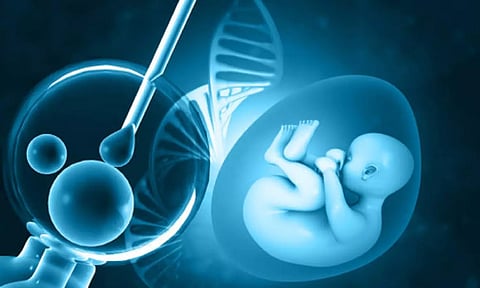

NEW DELHI: Women trying to get pregnant via in vitro fertilisation (IVF) have become the latest victims of the ongoing air pollution levels in the national capital, claimed a fertility expert on Thursday.
While previous research has established air pollution’s effect on declining fertility, it is the first time that IVF sessions are getting “increasingly cancelled” as air quality is affecting health of women, Dr Shivani Gour, Vice President of Delhi State Chapter of Indian Society of Assisted Reproduction (ISAR), told IANS.
This comes amidst continuing pollution levels witnessed in the national capital raising cases of asthma, lung problems, red eyes, itchy throat among others. The overall Air Quality Index (AQI) on Thursday morning continued to be in the ‘very poor’ category, according to data from the System of Air Quality and Weather Forecasting And Research (SAFAR).
A cycle of IVF can be explained as - the ovaries are stimulated to produce eggs, these are collected and combined with sperm to form one or more embryos and one or two are placed into the womb as fresh embryos.
If any embryos are frozen and used later this is still part of the same cycle. For most women, one cycle of IVF can take between four to six weeks.
“On an average daily one session of IVF is getting cancelled as women are suffering from air pollution-related conditions such as cough, bad throat, redness in the eye, among others,” said Dr Gour.
“Today in the OPD unfortunately I had to postpone IVF cycle of 2 patients because of air pollution: one had severe cough, irritated throat and inability to sleep at night; the other patient had a redness in the eyes and lymphatic swelling in the neck (which can occur due to common cold),” the doctor said.
The doctor told IANS that many of the patients are “young in their 30s, with no other health conditions and those undergoing a frozen embryo transfer (FET)”.
FET is a type of IVF treatment in which a cryopreserved embryo created in a previous egg retrieval cycle is thawed and transferred to the uterus.
The women will now have to wait for a month, before they can undergo another cycle, said Dr Gour who noted that in addition to patients, even the hospital bears the brunt of a cancelled cycle. She suggested women planning for IVF to stay indoors during maximum pollution levels, and to eat healthy, exercise, etc.
While other fertility experts said they have not witnessed such a situation, they emphasised that the air pollution can have a serious effect on fertility levels.
“Decision to postpone an IVF cycle cannot be attributed to air pollution alone,” Dr Anju Yadav, Senior Consultant - Fertility at Cloudnine Group of Hospitals, Gurugram told IANS.
She cited research suggesting a correlation between high levels of air pollution and lower success rates in assisted reproductive technologies like IVF.
“Air pollution can negatively impact fertility by affecting reproductive health in both men and women. It can lead to issues such as hormonal imbalances, oxidative stress, and inflammation, ultimately affecting the quality of sperm and eggs. In addition, exposure to certain pollutants has been linked to increased risks of miscarriage and complications during pregnancy,” Dr Yadav said.
She stressed that long-term exposure to air pollutants like particulate matter (PM), nitrogen dioxide (NO2), and volatile organic compounds (VOCs) “may disrupt the endocrine system, interfere with ovarian and testicular function, and impact embryo implantation”.
Dr. Anu Sadashiv, Reproductive Medicine Specialist at Milann Fertility and Birthing Hospital, Bengaluru also emphasised the need to regulate indoor pollution levels.
“The success rate of IVF solely depends on the embryos and these embryos are stored in the embryology lab under critical conditions. So it is crucial to regulate the air quality inside the labs,” Dr. Sadashiv told IANS.
“The embryology labs are equipped with HEPA filters and laminar airflow and optimal temperature, and gas concentration to support the survival and growth of the embryos. Any breach in these mechanisms can significantly affect the success rate of IVF. The air pollutants may act as endocrine disruptors or reactive oxygen species inducers and through epigenetic modifications,” she said.